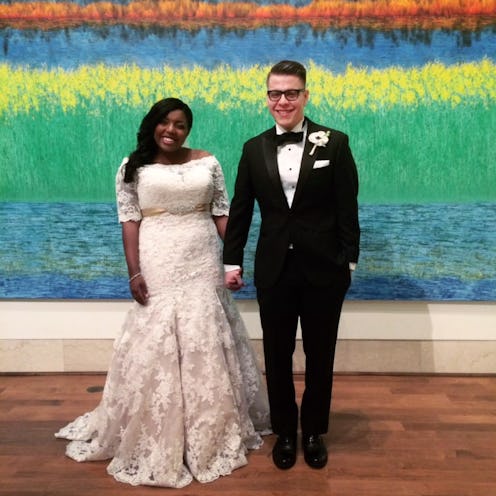
Deciding what to do with your last name after you get married is an intensely personal decision that should be between you and your partner, even though any married couple can tell you about the pressure other people will place on you. You have options if you don't want to take your partner's last name. You can hyphenate, create a new last name together or your husband can take your name — one recent study found that 1 in 10 British men adopt their wives's last names. I went the traditional route, but there are things I wish I'd known about taking my husband's name after getting married.
My decision to ditch my old last name wasn't a particularly emotional one. My maiden name is disappointingly common, and I could only find one other "Ayana Lage" on Google. I figured I'd get a chance at standing out. I understood the problematic fact that women are often expected to change their names but made a decision for myself. I'm a bit of a romantic, so I liked the idea of ditching my old name, anyway. I was moving hundreds of miles thanks to a change in my future husband's career, and I'd be leaving pretty much everything I knew behind. A new name seemed fitting.
Once the excitement of our wedding and honeymoon faded and we returned to normalcy, I started the name change process. The cost and overall process varies by state, but it generally involves trips to various governmental agencies. I had to take my birth certificate and marriage license to the closest U.S. Social Security Administration office then use my new social security card to change my driver's license. Once I had a new driver's license, I updated my name with my bank and insurance companies. Even though I changed my name on social media networks the day after we were legally married, I didn't complete the name change process until several months after. It was expensive and tiresome. Making the decision to change my name wasn't an emotional one, but losing my maiden name brought up some unexpected sadness. Ayana Stewart was gone, and I was now Ayana Lage. I loved all that my new name represented — I had a husband! A really good one! — but a part of me felt like I'd lost all the accomplishments I had pre-marriage.
Those moments didn't disappear, of course, but it felt like they belonged to someone else. One of my proudest pieces of writing is a first-person essay I wrote for the Tampa Bay Times, but Ayana Lage hadn't done that. This sounds vain, I'm sure, but my personal brand pretty much disappeared. Long gone were the hard-earned articles and awards I'd worked for. When you Googled my new name in those first few months, nothing came up. It felt as if I didn't really exist.
I also felt disconnected from my parents and siblings, even though it was just a name. I started a new family when I married my husband, but it felt like I was losing my old one because we moved away from them. All of the internal turmoil I felt about the name change actually served as a fitting reminder that relationships are much messier in real life than they are on social media. Before I got married, I filled my Instagram with posts about how I couldn't wait to be "Mrs. Lage" just like I'd seen other married friends do. Many of my friends, especially those who were older than me, looked on with envy, telling me I was lucky to find my soulmate at such a young age. (I got married at 22 years old.) I felt ungrateful whenever I complained or felt like marriage was hard work or resented my husband for moving us away from family. Name change or not, your marriage won't be perfect, and realizing that you'll face challenges doesn't make you ungrateful. Would I change my name again? Probably. It hasn't even been two years with my new surname, and it's begun to feel familiar. The only thing I wish is that I'd considered all the possible feelings a name change would bring before I made the decision.